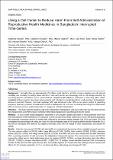Files in this item
Using a call center to reduce harm from self-administration of reproductive health medicines in Bangladesh : Interrupted time-series
Item metadata
| dc.contributor.author | Keenan, Katherine | |
| dc.contributor.author | Footman, Katharine | |
| dc.contributor.author | Sadekin, Munnaf | |
| dc.contributor.author | Reiss, Kate | |
| dc.contributor.author | Yasmin, Reena | |
| dc.contributor.author | Franklin, Hannah | |
| dc.contributor.author | Church, Kathryn | |
| dc.date.accessioned | 2020-01-29T11:30:06Z | |
| dc.date.available | 2020-01-29T11:30:06Z | |
| dc.date.issued | 2019-08-04 | |
| dc.identifier | 265945521 | |
| dc.identifier | 706bf25a-2e9d-4202-b640-2b1004f32b7b | |
| dc.identifier | 85102376939 | |
| dc.identifier | 000526816600005 | |
| dc.identifier | 85071500191 | |
| dc.identifier.citation | Keenan , K , Footman , K , Sadekin , M , Reiss , K , Yasmin , R , Franklin , H & Church , K 2019 , ' Using a call center to reduce harm from self-administration of reproductive health medicines in Bangladesh : Interrupted time-series ' , JMIR Public Health and Surveillance , vol. 5 , no. 3 , e12233 . https://doi.org/10.2196/12233 , https://doi.org/10.2196/12233 | en |
| dc.identifier.issn | 2369-2960 | |
| dc.identifier.other | ORCID: /0000-0002-9670-1607/work/67919839 | |
| dc.identifier.uri | https://hdl.handle.net/10023/19369 | |
| dc.description | This study was funded by the Department of International Development, UK. | en |
| dc.description.abstract | Background: Annually, there are approximately 25 million unsafe abortions, and this remains a leading cause of maternal morbidity and mortality. In settings where abortion is restricted, women are increasingly able to self-manage abortions by purchasing abortion medications such as misoprostol and mifepristone (RU-486) from pharmacies or other drug sellers. Better availability of these drugs has been shown to be associated with reductions in complications from unsafe abortions. In Bangladesh, abortion is restricted; however, menstrual regulation (MR) was introduced in the 1970s as an interim method of preventing pregnancy. Pharmacy provision of medications for MR is widespread, but customers purchasing these drugs from pharmacies often do not have access to quality information on dosage and potential complications. Objective: This study aimed to describe a call center intervention in Bangladesh, and assess call center use over time and how this changed when a new MR product (combined mifepristone-misoprostol) was introduced into the market. Methods: In 2010, Marie Stopes Bangladesh established a care provider–assisted call center to reduce potential harm from self-administration of MR medications. The call center number was advertised widely in pharmacies and on MR product packaging. We conducted a secondary analysis of routine data collected by call center workers between July 2012 and August 2016. We investigated the reported types of callers, the reason for call, and reported usage of MR products before and after November 2014. We used an interrupted time series (ITS) analysis to formally assess levels of change in caller characteristics and reasons for calling. Results: Over the 4-year period, 287,095 calls about MR were received and the number of users steadily increased over time. The most common callers (of 287,042 callers) were MR users (67,438, 23.49%), their husbands (65,999, 22.99%), pharmacy workers (65,828, 22.93%), and village doctors (56,036, 19.52%). Most MR calls were about misoprostol, but after November 2014, a growing proportion of calls were about the mifepristone-misoprostol regimen. The most common reasons (of 287,042 reasons) for calling were to obtain information about the regimen (208,605, 72.66%), to obtain information about side effects (208,267, 72.54%), or to report side effects (49,930, 17.39%). The ITS analyses showed that after November 2014, an increasing number of calls were from MR users who had taken the complete regimen (P=.02 and who were calling to discuss reported side effects (P=.01) and pain medication (P=.01), and there were fewer calls asking about dosages (P<.001). Conclusions: The high call volume suggests that this call center intervention addressed an unmet demand for information about MR medications from both MR users and health care providers. Call center interventions may improve the quality of information available by providing information directly to MR users and drug sellers, and thus reducing the potential harm from self-management of MR medications. | |
| dc.format.extent | 649741 | |
| dc.language.iso | eng | |
| dc.relation.ispartof | JMIR Public Health and Surveillance | en |
| dc.subject | Abortion | en |
| dc.subject | Bangladesh | en |
| dc.subject | Call center | en |
| dc.subject | Health behavior | en |
| dc.subject | Help-seeking behavior | en |
| dc.subject | Induced | en |
| dc.subject | Legal | en |
| dc.subject | Menstrual regulation | en |
| dc.subject | Reproductive health | en |
| dc.subject | RA0421 Public health. Hygiene. Preventive Medicine | en |
| dc.subject | Public Health, Environmental and Occupational Health | en |
| dc.subject | Health Informatics | en |
| dc.subject | NDAS | en |
| dc.subject | SDG 3 - Good Health and Well-being | en |
| dc.subject.lcc | RA0421 | en |
| dc.title | Using a call center to reduce harm from self-administration of reproductive health medicines in Bangladesh : Interrupted time-series | en |
| dc.type | Journal article | en |
| dc.contributor.institution | University of St Andrews. School of Geography & Sustainable Development | en |
| dc.identifier.doi | 10.2196/12233 | |
| dc.description.status | Peer reviewed | en |
This item appears in the following Collection(s)
Items in the St Andrews Research Repository are protected by copyright, with all rights reserved, unless otherwise indicated.

